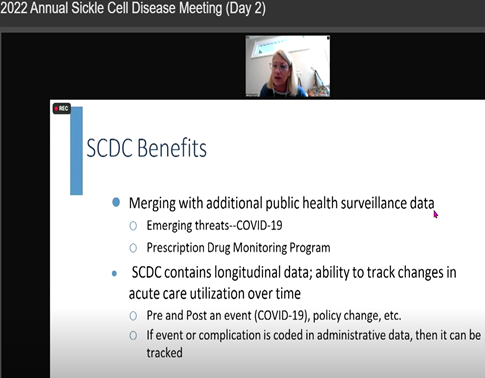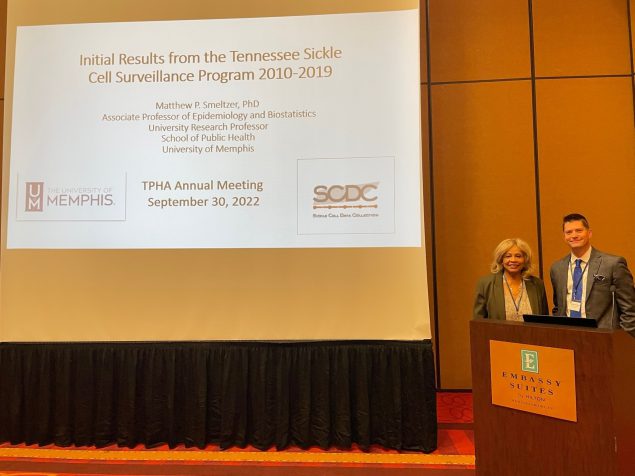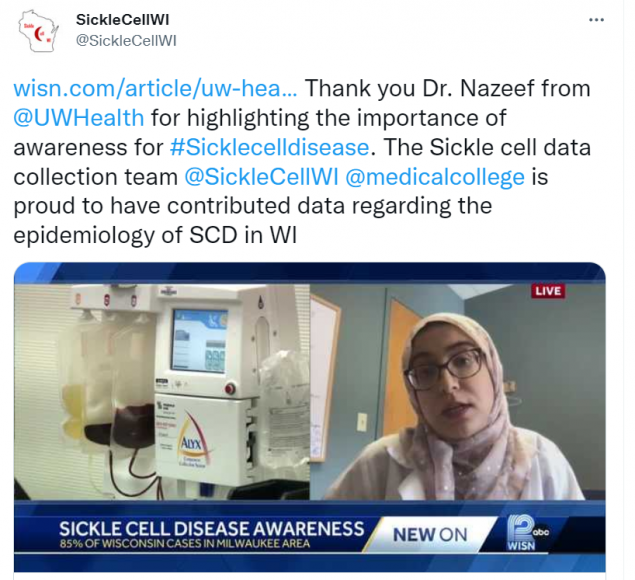The Bloodline Newsletter: November 2022

Mission: To improve quality of life, life expectancy, and health among people living with sickle cell disease (SCD).
November 2022 Issue
Communications Corner
- During Sickle Cell Awareness Month, CDC shared information on SCD surveillance, personal stories of people living with SCD, resources on blood transfusions, and more.
- CDC launched the Stories of Sickle Cell project, which aims to highlight the unique stories and diverse identities of those living with SCD. Check out the video series, short stories, and photoblog.
- CDC released Vital Signs focused on preventing complications from sickle cell anemia in children. It highlighted data showing that use of screening and treatments available to prevent and reduce the severity of complications from this condition are far too low.
- New content on pain management was added to CDC’s Steps to Better Health toolkit:
- SCDC California released the data brief “Mapping Sickle Cell Disease Care in Los Angeles County.”
- SCDC Wisconsin shared the infographic “Sickle Cell Disease in Wisconsin” on Twitter and Facebook.
- SCDC Indiana data was highlighted in the WFYI Indianapolis story “Helping sickle cell patients starts with collecting better data,” which mentions data gaps and how the SCDC program can address them.
- SCDC Wisconsin data about the epidemiology of SCD in Wisconsin was used in the Milwaukee TV news station WISN’s interview with Dr. Nazeef, who highlighted the importance of SCD awareness.
Trainings & Webinars
SCDC California hosted its final webinar of the year, “COVID-19 outcomes among people with sickle cell disease and sickle cell trait in Michigan,” which was presented by Dr. Sarah Reeves in October 2022.
In the Community
SCDC Tennessee participated in the annual Sickle Cell Awareness Day event at the University of Memphis (UofM). Hosted by the Department of Communication and Film, the Sickle Cell Foundation of Tennessee, the Sickle Cell Clinic at St. Jude Children’s Research Hospital, and the School of Public Health at the UofM, the event included tables from various stakeholder organizations that sought to educate the campus about SCD.
Recent Publications
- SCDC Georgia and SCDC California teams published a research letter, “Hematologist encounters among Medicaid patients who have sickle cell disease,” assessing the frequency of hematologist visits for receiving care among people with SCD. Findings showed that people with SCD see hematologists at a lower rate compared with people with other chronic genetic diseases, such as cystic fibrosis and hemophilia.
- SCDC Georgia and SCDC California teams co-authored a Morbidity and Mortality Weekly Report with CDC, “Surveillance for Sickle Cell Disease — Sickle Cell Data Collection Program, Two States, 2004–2018.” The surveillance summary outlines the history of the SCDC program, describes the methodology of establishing a surveillance program for SCD, and discusses the use of prevalence data in informing healthcare providers and policy makers to improve care for people with SCD. Information on capacity building of additional states that participate in the SCDC program is also described. To date, 11 states participate in the SCDC program.
Up-to-Data
- SCDC Georgia data updates
- A biopharmaceutical company requested demographic and healthcare utilization data of those with SCD in the state of Georgia using annual report data for Georgia since 2015. SCDC Georgia shared most recently published annual report data as of 2018.
- A SCD community-based organization requested data on the prevalence of SCD in three counties: Baldwin, Bibb, and Peach. This information will help the organization implement outreach services to SCD patients and direct them to federally qualified health centers to access care locally. SCDC Georgia provided information on the 344 people with SCD residing in these three counties, along with healthcare utilization and payer information.
- SCDC North Carolina data updates
- SCDC North Carolina is accepting data analysis requests as of October 31, 2022. SCDC North Carolina’s data assets include statewide data sources including newborn screening records, death certificates, emergency department/hospital discharge records, and other administrative and clinical databases. Only aggregate-level analyses may be requested. Data analysis requests are welcome from all states, and requesters are highly encouraged to reach out to nc_sickledata@duke.edu to discuss their request. Submission of the request does not guarantee the analysis will be completed. Whether a request is completed depends on the scope of the request, whether it falls within the goals of the SCDC North Carolina program, the number of requests received and available resources, and approval from the North Carolina Department of Health and Human Services, Division of Public Health.
- SCDC North Carolina collaborated with the Medical Research Committee of the governor’s appointed North Carolina Council on Sickle Cell Disease and Related Disorders on an initiative to improve emergency department (ED) care for people with SCD in the state. The initiative includes the implementation of an ED pain-management toolkit to improve management of vaso-occlusive pain episodes. Also included is a screening and referral tool to identify unmet social determinants of health needs for people with SCD and refer them to the state’s sickle cell syndrome program. SCDC North Carolina provided ED utilization tables ranked by the top 20 facilities with the highest number of ED visits between 2013 and 2019. This information was used to guide the team in prioritizing implementation efforts at institutions with the highest ED visits in the state.
- SCDC North Carolina collaborated with North Carolina Department of Health and Human Services, Division of Health Benefits (North Carolina Medicaid) to define the cohort of people with SCD who would be eligible for transcranial doppler (TCD) screening in North Carolina. The analysis is part of an initiative at North Carolina Medicaid to identify barriers to TCD screening among North Carolina Medicaid beneficiaries.
Presentations & Meetings
- During the August 8–10, 2022, NHLBI Annual Sickle Cell Disease Research meeting, five SCDC states shared information from their programs:

SCDC Georgia's Angela Snyder presents during the NHLBI Annual Sickle Cell Disease Research meeting.
- SCDC California described how it is using SCDC data to determine how many people with SCD are seeing a hematologist and how these findings highlight an opportunity to improve access to care for people with SCD.
- SCDC Georgia presented preliminary results using SCDC data to assess the healthcare utilization of people with SCD during the COVID-19 pandemic, including the use of telemedicine services before and during the pandemic.
- SCDC Michigan explained how using information from SCDC to understand the true number of people with SCD in a state, as well as where they live, is an essential consideration when expanding policies and services for people with SCD.
- SCDC North Carolina illustrated how SCDC data can be used to describe acute care utilization in people with SCD and how the data can guide the implementation of interventions and initiatives to improve SCD care.
- SCDC Tennessee spoke about current approaches to data modernization for SCD surveillance and possible models that SCDC may employ to standardize methods across all participating states.
- SCDC Georgia hosted its Stakeholder Advisory meeting August 31, 2022, with participation from clinicians, CBOs, staff from the Georgia Department of Public Health, and other public health experts. SCDC Georgia obtained input on current studies in progress, namely, Georgia SCD immunization adherence study and potential topics for SCD pain studies in Georgia.
- CDC held the SCDC program’s quarterly meeting September 13, 2022. The meeting included CDC updates, manuscript presentations, and breakout sessions on topics including the Community Outreach Workgroup and this fall’s reverse site visit.

SCDC Tennessee’s Matthew Smeltzer presents at the Tennessee Public Health Association Annual Conference.
- SCDC Tennessee’s Dr. Matthew Smeltzer gave a 1-hour presentation at the Tennessee Public Health Association Annual Conference on September 30, 2022. Dr. Smeltzer discussed the current knowledge gaps around SCD, SCDC Tennessee’s vision, and the current data available from SCDC Tennessee. SCDC Tennessee aims to put data into action by expanding collaborations with the broader public health community in the state.
In The News
This section is shared to provide awareness of articles on SCD currently presented in the media. Linking to a non-federal site does not constitute an endorsement by CDC or any of its employees of the sponsors, information, and products presented on the site.
- Opinion: Support patients by eliminating disparities in pain care
- Sickle cell disease patients who rely on blood transfusions need more Black blood donors
- Sickle cell patients are often misdiagnosed. Researchers, lawmakers are trying to change that
- Commentary: A disease that shows illness of healthcare system, society
- Sickle Cell Awareness Month
- 5 things to know about… sickle cell disease
- 5-year-old girl donates blood to save brother with sickle cell anemia
- What to know about sickle cell disease
- A call to the Black community: Donate blood to help those suffering from sickle cell disease
- Seasonal changes can trigger hospitalization with sickle cell
- Patients with sickle cell disease less likely to receive specialized care
- Contraception counseling for SCD women found to vary by provider
- Pneumococcal vax slashed deadly sickle-cell complication in kids
- Higher Hydroxyurea exposure tied to better blood parameters in US
- Lifetime medical costs of sickle cell disease total $1.7 million
- New York Jets running back Tevin Coleman: Sickle-cell trait threatened my career. Now, I’m raising a daughter with sickle-cell disease
Contact
For any questions about the SCDC program, contact Mary Hulihan or Mandip Kaur.
If you are not currently a subscriber, click the subscribe button below to get SCDC program updates.



